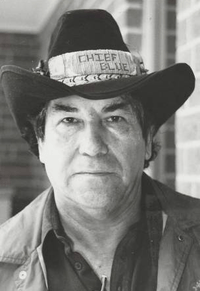Gilbert Blue facts for kids
Quick facts for kids
Gilbert Blue
|
|
|---|---|
 |
|
| Chief of the Catawba Nation | |
| In office 1973–2007 |
|
| Preceded by | Albert Sanders |
| Succeeded by | Buck George (acting) |
| Personal details | |
| Born | December 5, 1933 |
| Died | June 11, 2016 (aged 82) Rock Hill, South Carolina, U.S. |
| Cause of death | Mesothelioma |
| Spouse | Elizabeth Sharpe |
| Occupation | Politician |
| Known for | Federal rerecognition of the Catawba Nation |
| Military service | |
| Allegiance | |
| Branch/service | United States Navy |
| Years of service | 1951–1960 |
Gilbert Blue (born December 5, 1933 – died June 11, 2016) was an important Native American leader. He served as the chief of the Catawba Nation in the U.S. state of South Carolina. Chief Blue led his people from 1973 until 2007. During his time as chief, the Catawba Nation received official recognition from the U.S. government. This was a very big achievement for his people.
Contents
Who Was Gilbert Blue?
Gilbert Blue was born on December 5, 1933. He was the grandson of another important chief, Samuel Taylor Blue. This meant leadership was part of his family history. Gilbert Blue was also a member of the Church of Jesus Christ of Latter-day Saints. He passed away on June 11, 2016, due to mesothelioma.
Leading the Catawba Nation
As chief, Gilbert Blue was the main leader of the Catawba Nation. He worked to protect the rights and culture of his people. His most important work was getting the Catawba Nation officially recognized by the United States government. This process is called "federal recognition."
What is Federal Recognition?
Federal recognition means that the U.S. government officially accepts a Native American tribe as a sovereign nation. This gives the tribe special rights and benefits. It helps them govern themselves and get support for things like healthcare and education. For the Catawba Nation, this recognition was a huge step forward. It confirmed their identity and their place in the country.
Gilbert Blue's Legacy
Gilbert Blue's leadership brought many positive changes to the Catawba Nation. His efforts helped secure a better future for his people. He is remembered as a strong and dedicated leader who fought for his community. His work on federal recognition remains a key part of his legacy.
 | Toni Morrison |
 | Barack Obama |
 | Martin Luther King Jr. |
 | Ralph Bunche |

